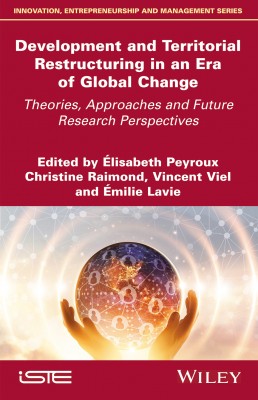
Thinking about development and the environment simultaneously is one of the biggest scientific and societal challenges of the 21st century. Understanding the interactions between biophysical systems and human activities in an era of global change requires overcoming disciplinary divides and opening up new epistemological perspectives.
This book explores these challenges using a territorial lens. Combining various scales of analyses (from global to local) and contexts (both urban and rural) in the North and in the South, it analyzes the relationships between environment and development through a variety of geographical objects (i.e. cities, rural and agricultural areas, coastlines, watershed), themes (i.e. ecological transitions, food, energy, transport, agriculture, mining activities) and methodologies (i.e. qualitative and quantitative approaches, modeling, in situ measurements).
By engaging in a dialogue between social science and natural science disciplines, within different fields and with a variety of forms of knowledge production, this book provides essential information for understanding and reading the complexity of a globalized world. This book is targeted at academics and students in social sciences and at stakeholders in the field of territorial and environmental management.
Part 1 How to Rethink Frames of Reference: Paradigms, Models, Epistemological and Theoretical Foundations.
1. The Food Transition, a Unique Model? Christine Raimond, Cécile Faliès, Angèle Proust and Bernard Tallet.
2. Development and Urban Environment Through the Prism of Risk and Crises, Alexis Sierra, Anaïs Béji, Axelle Croisé, Cyriaque Hattemer, Pascale Metzger, Marie Pigeolet and Irene Valittuto.
3. City, Environment and “Sustainable Development”: Critical Approaches and Renewal of Urban Research, Élisabeth Peyroux and Pascale Metzger.
4. Locating Heritage in the Cities of the South: Dialogue from Valparaiso and Yaoundé, Sébastien Jacquot, Marie Morelle and Muriel Samé Ekobo.
Part 2 Themes and Common Objects to Cross Global Changes and Territorial Dynamics.
5. The European Union and the Energy Transition: Development, Environment and Regional Integration, Angélique Palle and Yann Richard.
6. Transport in Africa: Between Global Influences and Local Know-how, Jérôme Lombard, Nora Mareï and Olivier Ninot.
7. Digital Revolution in Urban Transportation of the Southern Cities Questioned, Kei Tanikawa Obregon, Lisa Coulaud and Olivier Ninot.
8. Artisanal and Small-scale Gold Mining and Territorial Development in Africa: A Difficult Equation, Anna Dessertine, Raphaëlle Chevrillon-Guibert, Laurent Gagnol, Julie Betabellet, Lamine Diallo, Robin Petit-Roulet, Edith Sawadogo, Tongnoma Zongo and Géraud Magrin.
9. New Approaches to City–Countryside Relations, Martine Berger and Jean-Louis Chaléard.
10. Using Scientific Modeling for Adaptation of Agriculture to Climate Change: A Political and Organizational Challenge, Malika Madelin and Évelyne Mesclier.
11. Hydrogeography: Towards a Systemic Analysis in the Context of Global Changes, from Watershed to Spillway Basin, Vincent Viel, Émilie Lavie, Guillaume Brousse, Benoît Carlier, Luc Michler, Mathilde Resch, Gashin Shahsavari and Gilles Arnaud-Fassetta.
Part 3 Knowledge Production and Knowledge through the Relationship between Science and Society.
12. The Ecological Transition of the Coastline in France, Frédéric Bertrand and Brice Anselme.
13. IPCC Reports and their Implementation into Policy: Between Science and Strategy, Jean-Claude Berges and Hubert Cochet.
14. Research, Expert Assessment and Development: The Difficult Dialogue Between Social Sciences and Public Policies Around Lake Chad, Géraud Magrin, Charline Rangé, Audrey Koumraït-MBagogo, Abdourahamani Mahamadou, Jacques Lemoalle and Christine Raimond.
Élisabeth Peyroux is a geographer and researcher at the CNRS, France. Her research focuses on urban policies and development issues in Africa.
Christine Raimond is a research director at the CNRS, whose research combines development and the environment through the study of the management of living things and territories.
Vincent Viel is a lecturer at Université Paris Cité, France, and a geomorphologist specializing in the analysis of continental hydrosystems.
Émilie Lavie is a geographer and lecturer at Université Paris Cité. Her work focuses on water management and hydrosystems in arid environments.